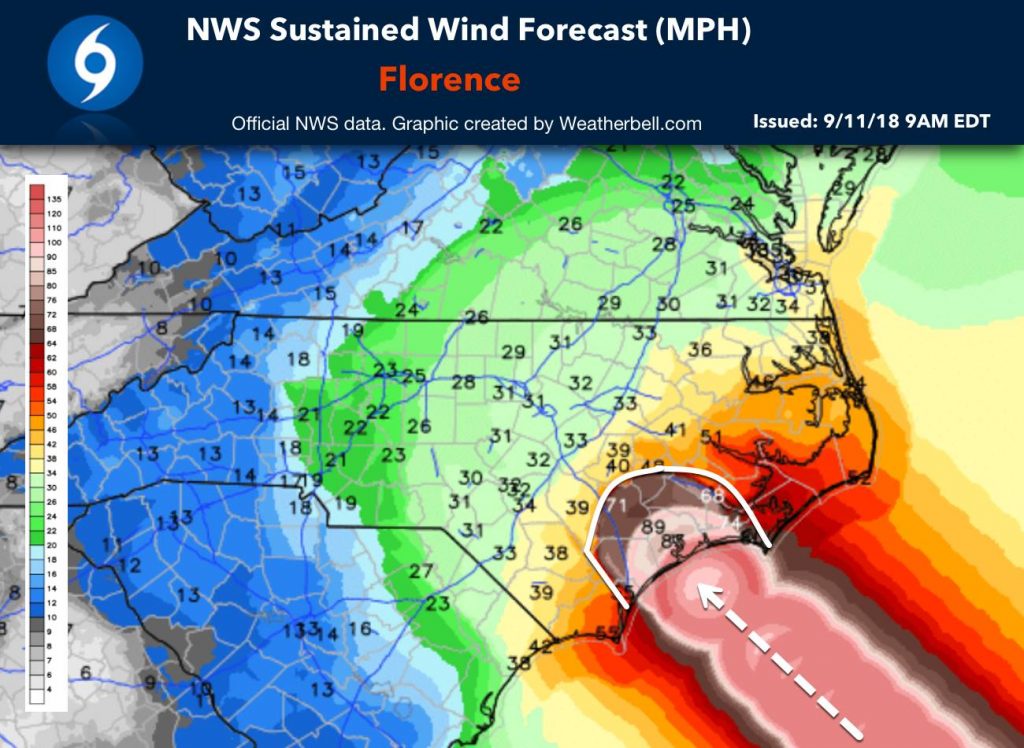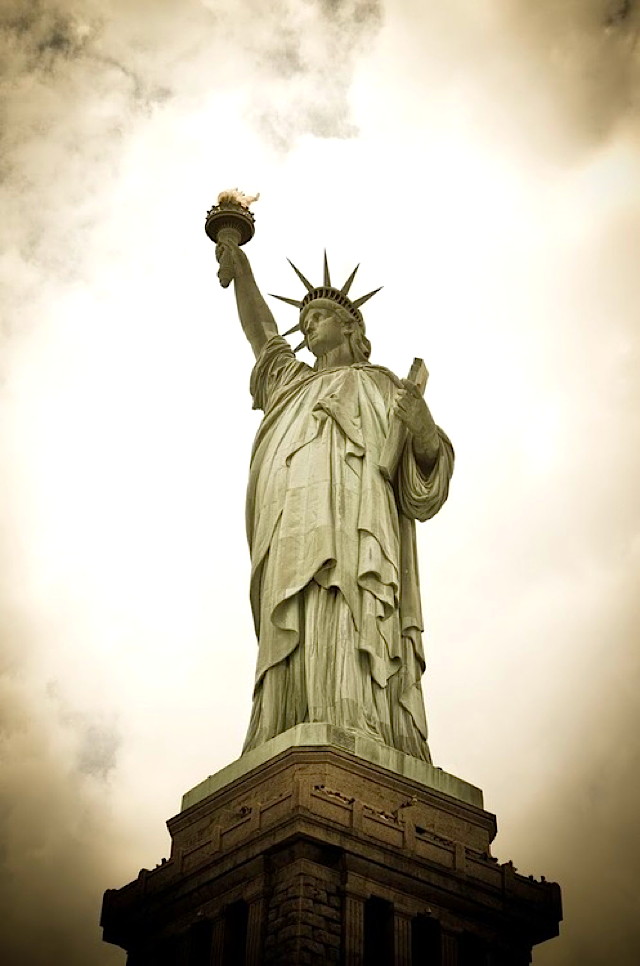 It would seem that the National Weather Service is tell all that Carolina is about to get f**ked.
It would seem that the National Weather Service is tell all that Carolina is about to get f**ked.
Forecasters for the national weather service are calling this a “historical weather event.” If Florence is a Category 4 hurricane when it makes landfall in North Carolina, United States, it will be only the second in history to reach landfall at that strength in NC. The other Cat 4 was Hurricane Hazel in 1954. This storm is not only supposed to have sustained winds of 100+ mph for more than 24 hours, it is also supposed to stall out over the state dropping 10-20 inches of rain. While you can’t plan for every contingency, you can prepare for the worst. I invite our prepper community to add to the following list. Be safe out there.
UPDATE: Sharknado Panic Level Unlocked.

IF YOU ARE IN AN EVACUATION ZONE, [Guess what?] EVACUATE THE AREA. [But just get these few chores done first you poor suffering bastard.]

- Charge any device that provides light. Laptops, tablets, cameras, video cameras, and old phones. Old cell phones can still be used for dialing 911. Charge external battery backups (power banks).
- Wash all trash cans, big and small, and fill with water for flushing toilets. Line outdoor trash cans with trash bags, fill with water and store in the garage. Water in trash bags should not be used to bathe or drink. Bags contain chemicals to suppress insect and odor. Use for toilet flushing purposes only.
- Fill every tub and sink with water. Cover sinks with Saran Wrap to keep it from collecting dust. Fill washing machine and leave the lid up to store water.
- Fill old empty water bottles and other containers with water and keep near sinks for washing hands.
- Fill every Tupperware with water and store in the freezer. These will help keep food cold longer and serve as a backup water supply.
- Fill drinking cups with water and cover with Saran Wrap. Store as many as possible in the fridge. The rest you can store on the counter and use first before any water bottles are opened. Ice is impossible to find after the storm.
- Reserve fridge space for storing tap water and keep the sealed water bottles on the counter.
- Cook any meats in advance and other perishable foods. You can freeze cooked food. Hard boil eggs for snacks for the first day without power.
- Be well hydrated before the storm hits and avoid salty foods that make you dehydrated.
- Wash all dirty clothes and bed sheets. Anything dirty will smell without the A/C, you may need the items, and with no A/C, you’ll be sweating a lot. You’re going to want clean sheets.
- Toss out any expiring food, clean cat litter boxes, empty all trash cans in the house, including bathrooms. Remove anything that will cause an odor when the A/C is off. If you don’t have a trash day pickup before the storm, find a dumpster.
- Bring in any yard decor, secure anything that will fly around, secure gates, bring in hoses, potted plants, etc. Bring in patio furniture and grills.
- Clean your environment so you have clear, easy escape routes. Even if that means temporarily moving furniture to one area.
- Scrub all the bathrooms so you are starting with a clean odor free environment. Store water-filled trash cans next to each toilet for flushing.
- Place everything you own that is important and necessary in a backpack or small file box that is easy to grab. Include your wallet with ID, phone, hand sanitizer, snacks, etc. Get plastic sleeves for important documents.
- Make sure you have cash on hand.
- Stock up on pet food and fill up bowls of water for pets.
- Refill any medications. Most insurance companies allow for 2 emergency refills per year.
- Fill your propane tanks. You can heat soup cans, boil water, make coffee, and other stuff besides just grilling meat. Get an extra, if possible.
- Drop your A/C in advance and lower temperatures in your fridges.
- Gather all candles, flashlights, lighters, matches, batteries, first aid kit, and other items and keep them accessible.
- Clean all counters in advance. Start with a clean surface. Buy Clorox Wipes for cleaning when there is no power. Mop your floors and vacuum. If power is out for 10 days, you’ll have to live in the mess you started with.
- Pick your emergency safe place such as a closet under the stairs. Store the items you’ll need in that location for the brunt of the storm. Make a hand fan for when the power is out.
- Shower just before the storm is scheduled to hit.
- Keep baby wipes next to each toilet. Don’t flush them. It’s not the time to risk clogging your toilet!
- Run your dishwasher, don’t risk having dirty smelly dishes and you need every container for water! Remember you’ll need clean water for brushing your teeth, washing, and cleaning your hands.
- Pack a small suitcase and keep it in your car in case you decide to evacuate. Also, put at least one jug of water in your car. It will still be there if you don’t evacuate. You don’t need to store all the water in the house. Remember to pack for pets as well.
- Check on all family members, set up emergency back up plans, and check on elderly neighbors.
- Pets are family too. Take them with you.
- Before the storm, unplug all electronics. There will be power surges during and after the storm.
- Cover televisions, computer monitors and other electronic devices with trash bags in case windows break and expose the interior of the house to the elements.
- Cover windows with plywood from the outside.
- Gas up your car and have a spare gas container for your generator or your car when you run out.
- Touch base with neighbors prior to the storm to determine if they are ready and capable to weather the storm. Building relationships with neighbors also come in handy if you need to borrow a chainsaw or need extra hands to clear debris.
- Take a video of your house and contents. Walk room to room, opening cabinets, drawers, and closets. Make sure to highlight model and serial numbers of appliances. Don’t forget outbuildings and sheds where you keep tools and equipment. This will help if you need to make an insurance claim later.
- In your freezer, freeze a cup of water and place a coin on top after it is frozen. When the power goes out, if the coin stays on top, the food is staying frozen. If the coin falls into the water, the freezer thawed out and most food will likely need to be thrown away.
- Finally, anything that you want to try and preserve, but you can’t take with you—place it in a plastic bin and put in your dishwasher, lock the door. This should make it watertight in case of any water intrusion into your home. But of course, take all the important/irreplaceable items you can.



![Allen Ginsberg: The Interview, <strong> ➡ 1972 ⬅ </strong> [Republished by unpopular demand] ginsbergnirvana](https://americandigest.org/wp/wp-content/uploads/2022/05/ginsbergnirvana-150x150.jpg)
![That Was the Whopper Weekend That Was [Illustrated] welcometohell](https://americandigest.org/wp/wp-content/uploads/2021/05/welcometohell-150x150.jpg)



 Gerard Van der Leun
Gerard Van der Leun
























Comments on this entry are closed.
My Marine son and his wife are at Camp Lejeune…Pretty much the ground-zero of this storm. They won’t evacuate, as they are part of the rescue team if needed. Their onbase housing is new and very robust, so they feel pretty confident. The folks in older units, (and some barracks) are bugging out, along with the civilians and non-essentials.
I think SC is pretty screwed. Even the graphic is suggestive!
My son is also at LeJeune, and will ride it out. I trust his decision to stay as the release time was too late to make bugging out a viable option since we live 7 hours away with no traffic and that is not the case at this time.
That’s one hell of a good list. #36, the coin on the cup trick, is especially clever. Six items are all about having a clean, uncluttered house with everything squared away. So only 30 things to worry about if you’re not a slob.
Email from my sis this morning in Newport, all roads out are blocked, all store supplies are gone. Nothing to do now but hunker down and tooter up.
Son and his fiance’, daughter in law and two grandsons are in Myrtle Beach, about 3 miles inland and by the Intracoastal… aaannnddd they’re still there. Won’t listen to me or anyone else, apparently ‘someone’ taught him in his formative years to tell everyone to fuck off.
I have the comfort of not raising a fool, but a good hearted, strong son.
Please pray anyway.
Even as far inland as Clemson SC, where I live, they are expecting tropical storm force winds of 60 mph and rain of up to a foot. The ground is already saturated so there will be a lot of uprooted trees and power outages.
Hi Mike. Larry from Florida. Done this many times. You should be fine. Main issue is the hot muggy conditions afterwards and no power and no A/C. Stay safe.
….and the insects. We had a pool and a generator for the well and small back-up window ac and it was still murder to go 14 days without elect after Charlie. Then a month later Ivan. That was after 40 years in a row with no hurricane direct hits, in Lee County, FL.
Some random thoughts from a long time prepper and hurricane pro (did Fran et al. Down East and even did Ike in Cincinnati!). The first of which is that preparing for a hurricane or a full blown Woodpile apocalypse is not something one does today. It is a lifelong project that at which one gets incrementally better having experienced multiple events, and keeping up with changing times (new & better flashlights, etc.). So while everything on your list is good and reasonable, it’s also pretty well known to folks who pay attention, and beyond the scope of those who are just waking up.
(Aside– about the coin on the ice. Under these circumstances, just where is the home owner going to be but at home? Won’t he know that the power has gone out?)
I have family, too, in the area– daughter, two year old grandson, 80 year old mother. Never been so proud of daughter as I was yesterday. Called to say the only thing she had left to do was clean the house and do some laundry. That’s one of my pet peeves about preparedness lists. Few– this one being an exception– attend to real life. Put stuff away! In the dark, who wants to trip over toys? Clear surface areas. Have a full supply of clean towels and undies. A place for everything and everything in its place.
Here’s another peeve. Saturday husband and I will host a tailgate for about 120. Everywhere there will be portable generators quietly humming and running portable satellite dishes, TVs, crockpots. (I’m talking about an SEC tailgate and if you’ve ever been, you know what I mean.) So if watching ESPN Gameday on TV while you are *at a game* is important enough to have a generator, so is life. Take some responsibility. All you really need is one big enough to power the fridge. Save up your egg money and just get one.
(Re: the lifelong project. We are pretty well prepared. Our one outstanding issue is a whole house generator. Working on it.)
Redundancy is key. How many ways do you have to make coffee? Our goal is to go from normal to without power|water|propane normal as efficiently as possible. So coffee matters. Which means forms of energy matter. How many ways can you boil water?
Redundancy. Get a weather radio that has, in addition to AA batteries, a lithium battery, plug-in, and solar, a hand crank. Just in case.
Heh. Redundancy. We did a remodel a few years ago. Here on the Farm we use propane which means if the power’s out, we still have running hot water. But– just in case– we installed an electric hot water heater in the new bathroom. Just in case!
Preppers got a bad rap a few years ago on account of some over the top folks. But it is impossible to understate the value of being prepared. If you are prepared, you are an asset. And if it’s an attitude that needs to be running in the background, you’ll be less likely to be caught off guard. Here’s and example. Hurricane Ike (2008, just three years after Katrina) approached the Gulf states and so every single freaking Duke Electricity truck went to the Gulf. And when 75mph winds hit Cincy & the lights went out, there we were. Some were without power for three weeks. The tales of deep freezer waste are legendary. Now, Cincinnati’s not exactly without it’s weather issues. So if you have a deep freezer, wouldn’t you just naturally ask yourself if you have a way to keep the thing running in the event of __ ?
Also– get a couple of those Ankar battery chargers for your devises. They come in handy. And a pocket knife. And be sure you have a hand held can opener. General rule: for every kitchen small appliance, have a hand held equivalent. Redundancy is key.
Okay. That’s it. Sorry to prattle on & on but this is one of my favorite topics. And now… back to tailgating preps!
You can see the beach on the Outer Banks – across from Morehead City – at this link. The waves have gotten stronger in the last 24 hours.
https://www.wnct.com/weather/webcams/live-eye-9-from-the-seahawk-inn-villas-atlantic-beach
Florence would be just a fond memory by the time I got that checklist completed.
BillH for the win!
However they left the real #2 off the list.
#2 – Go to liquor store and buy vodka and OJ.
That would be my complete checklist.
One thing you should have is a case of beer and airline bottles/pints of Jack Daniels.
Why?
Not for you to drink but as barter. After one hurricane I had all the downed tree limbs (and some of them were huge!) cleared off and hauled away for a pint of Jack and letting the guy have half the wood for his fireplace. Took him 4 hours to do and he stacked my half of the wood nicely for me.
Not to make light of this but what we have here is another hurricane, just like most years. Nothing unusual, nothing out of the ordinary, nowhere as big as many past hurricanes. If you live in the coastal areas of the SE and weren’t prepared for this a month ago there isn’t much left to be said. I’ve lived in hurricane zones since I was born, truly have no idea how many and certainly no idea how many I’ve prepared for that didn’t hit. I don’t understand what a weather radio is going to do for you if you’re still at home. It’s too late to worry about what’s coming, that was 3 days ago. Water, gas, food you can grill, flashlights and your windows boarded up are about all you can do. Typically the actual bad storm part is not going to last that long. Irma was a rainy day until maybe 2 hours before the eye passed when it got windy then it was really ugly for an hour. Obviously, they aren’t all like that but most are.
ghost
do you remember Bill Zeliff? He was the longtime weatherman on the TV station here. He did a special back in the late eighties about hurricanes in an attempt to inject some common sense into the hurricane hysteria. The thing I remember the most was him saying that if you were living on the east coast of the US, Fort Myers, was pretty much the safest place you could be. He said Nashua, NH got hit more often than FM.
Rick, yeah I remember him. And Jim Reif.
How about that guy, don’t remember his name right now, but he used to throw his chalk up in the air and catch it in his shirt pocket at the end of each show. That was a long time ago.
Are you in Lee County?
I graduated at FM High in 72. Lived in FM (Tanglewood) 20 years and then CC (off Burnt Store) for 20 more. Left there in 2006 and haven’t been back since.